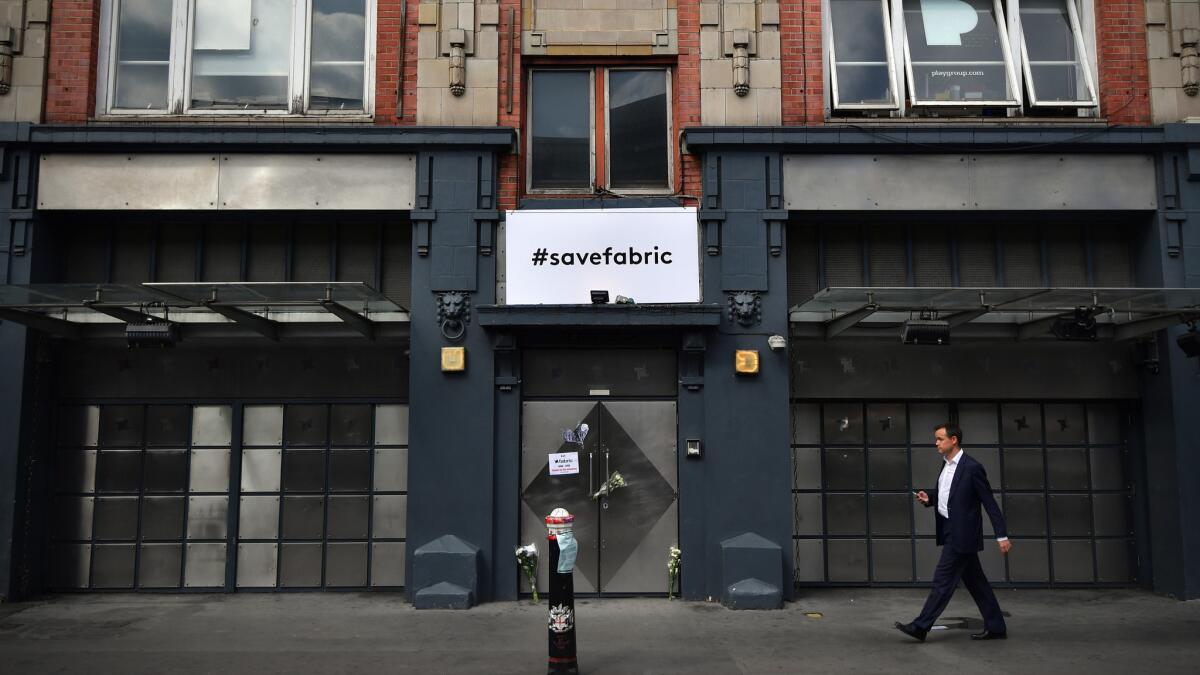In Fabric’s closing in London, an echo of L.A.’s rave scene woes

A world-class nightclub takes years to build, but it can be undone in just a few hours.
On Tuesday, the local council overseeing venue licensing in the Islington area of London revoked the permits for Fabric, one of the most influential and internationally renowned electronic music venues on the planet. The move came after a pair of drug-related deaths prompted an inquiry into the club’s security practices, which had been regarded as world-standard.
In terms of driving tourism, making artists’ careers and bolstering a city’s nightlife reputation, Fabric’s only real peer was Berghain in Berlin. The loss is a blow to dance music generally, and London’s nightlife industry specifically. More than 150,000 petition signers have lamented the decision, as well as Mayor Sadiq Khan, artists such as Ellie Goulding and the Chemical Brothers, and right-wing think tank Adam Smith Institute
The closure will be appealed, but at the moment there’s something of a “Brexit”-style lament whipping through UK club music.
There’s also a parallel here for Los Angeles, which is facing its own debates about drugs and safety at dance music events. No matter how vigilant a venue may be, it’s nearly impossible for a space to guarantee zero drug use among its patrons.
In L.A., much of our dance music culture is driven by large festivals and semi-legal warehouse parties rather than neighborhood nightclubs. This is due to a variety of reasons – 2 a.m. closing times and strict alcohol and dancing permit requirements, to start.
That means that our defining events, such as Hard Summer and last weekend’s Nocturnal Wonderland, take place in concert spaces well off the urban grid, often in hotter inland locales where regulations may be looser and space more plentiful, but where logistics are more difficult. The Times’ post-Hard-Summer reporting traced the move of big festivals from downtown L.A. into San Bernardino County,
That setup creates all of the risk of a festival, but none of the benefits of a well-operated urban nightclub. Since opening in 1999, Fabric has been a boon for tourism, and, just as importantly, helped create an image of London as 24-hour entertainment and nightlife capital. Read any of the thoughtful laments for the venue and you’ll see just how much people cared about this place, and what it meant to their lives and the vitality of the city around them.
Other outlets have summed up the local licensing concerns around Fabric, especially as it concerned the two recent deaths. Criticism from the Islington council included some borderline-absurd ideas, such as reducing the music’s BPM so as to discourage drug use. Such suggestions imply many hadn’t been inside the place they were preparing to close. But it also proves that club music fans can’t assume that their scene’s artistic merits are self-evident to outsiders.
Perhaps the new London “Night Czar” will be able to navigate all this. But given that more than half of live music venues in London have closed in the last eight years, the fight to have legal, reliable and sustainable venues for music may already be lost. Just days after the venue’s closing, the wheels of redevelopment at the site may already be turning.
But the lesson for L.A. and London alike is that there may not be a way to live up to a zero-tolerance, zero-incident standard in a way that preserves the cultural life of electronic music.
England in particular has an epidemic of binge drinking, but no one would dare suggest a widespread pub crackdown or a moratorium on football matches. Back home, we can shunt our raves practically to the Nevada border (and in the case of EDC, past it), but that doesn’t make a concert safer or easier to manage. In fact, as the Times’ Ron Lin reported, it often makes it harder.
Fabric was a local venue that tried to do it right and stay as transparent as possible about its safety procedures. L.A. doesn’t have any nightclub of similar caliber for it to lose, but it does have an enormous dance-music festival scene. Yet if Fabric can’t survive, it’s hard to imagine anywhere else holding up under that kind of standard.
For breaking music news, follow @augustbrown on Twitter.
ALSO
Tragedy once again calls into question Hard Summer’s future
Electric Daisy Carnival: Bigger, brighter and all grown up
More to Read
The biggest entertainment stories
Get our big stories about Hollywood, film, television, music, arts, culture and more right in your inbox as soon as they publish.
You may occasionally receive promotional content from the Los Angeles Times.







